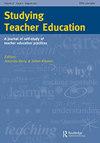Learning to Breathe Again: Found Poems and Critical Friendship as Methodological Tools in Self-Study of Teaching Practices
IF 1.5
Q2 EDUCATION & EDUCATIONAL RESEARCH
引用次数: 10
Abstract
ABSTRACT This self-study demonstrates how crafting found poems and critical friendship facilitated unstitching and (re)stitching narrative understanding for purposes of learning from pedagogy for improving practice. Findings extend existing literature by documenting how composing found poems from previous, dissertation research is a tool for inquiry, analysis, and representation for meaning-making within self-study methodology. Two sets of artifacts included the researchers’ dissertations framed as composite stories and drafts of found poems; these data were positioned and repositioned, woven as artifacts, field texts, and representations. We inquired how we might reposition ourselves to hear the multivoicedness of our temporal, personal-professional, and conceptual (con)texts. We asked, how might we utilize a familiar teaching practice to inquire into our lived experiences? How might found poems be positioned as both a methodological tool for analyzing completed research and representing meaning-making from deeply constructed narrative experiences? Found poetry enabled the researchers to evoke the fourth and fifth envisionment-building stances (Langer, 2011a), enabling them to ‘step back’ and reconsider what they know, and to develop deeper understandings that disrupted and transformed understanding. Through self-study with a critical friend, the poem as meaning-making event unfolded before us, weaving new threads, in the space of new tensions, resulting in new understandings. Analyzing and representing data through the process of composing found poems with a critical friend generates the vulnerable-confident; self-other; vision-revision; reading-composing; critiquing-discovering; powerful-empowering; learning-teaching; textual-intertextual; aesthetic-efferent; three-dimensional spaces for ongoing transformation where silent voices are liberated and heard through collaborative self-study methodology.学习再次呼吸:发现诗歌和批判性友谊作为教学实践自学的方法论工具
这篇自我研究展示了创作发现的诗歌和批判性友谊如何促进了对叙事理解的分离和(重新)整合,从而从教育学中学习,以提高实践水平。研究结果通过记录如何从以前的论文研究中创作发现的诗歌来扩展现有的文献,这些研究是在自学方法中进行调查,分析和表达意义的工具。两套文物包括研究人员的论文和发现的诗歌草稿;这些数据被定位和重新定位,编织成工件、领域文本和表示。我们询问我们如何重新定位自己,以听到我们的时间,个人-专业和概念性(非)文本的多重声音。我们问,我们如何利用熟悉的教学实践来探究我们的生活经历?如何将发现的诗歌定位为分析已完成研究的方法论工具,并代表从深刻构建的叙事经验中产生的意义?发现诗歌使研究人员能够唤起第四和第五种构建设想的立场(Langer, 2011),使他们能够“退后一步”,重新考虑他们所知道的,并发展更深层次的理解,从而破坏和改变理解。通过与一位批判的朋友的自学,诗歌作为意义创造的事件展现在我们面前,在新的紧张空间中编织新的线索,产生新的理解。通过与挑剔的朋友一起创作发现的诗歌来分析和呈现数据,产生了脆弱-自信;自我-他人;vision-revision;reading-composing;critiquing-discovering;powerful-empowering;教育教学;textual-intertextual;aesthetic-efferent;三维空间正在进行的转变,沉默的声音被解放,并通过协作自学方法听到。
本文章由计算机程序翻译,如有差异,请以英文原文为准。
求助全文
约1分钟内获得全文
求助全文
来源期刊

Studying Teacher Education
EDUCATION & EDUCATIONAL RESEARCH-
CiteScore
2.40
自引率
43.80%
发文量
23
期刊介绍:
Studying Teacher Education invites submissions from authors who have a strong interest in improving the quality of teaching generally and of teacher education in particular. The central purpose of the journal is to disseminate high-quality research and dialogue in self-study of teacher education practices. Thus the journal is primarily a forum for teacher educators who work in contexts and programs of teacher education.
 求助内容:
求助内容: 应助结果提醒方式:
应助结果提醒方式:


